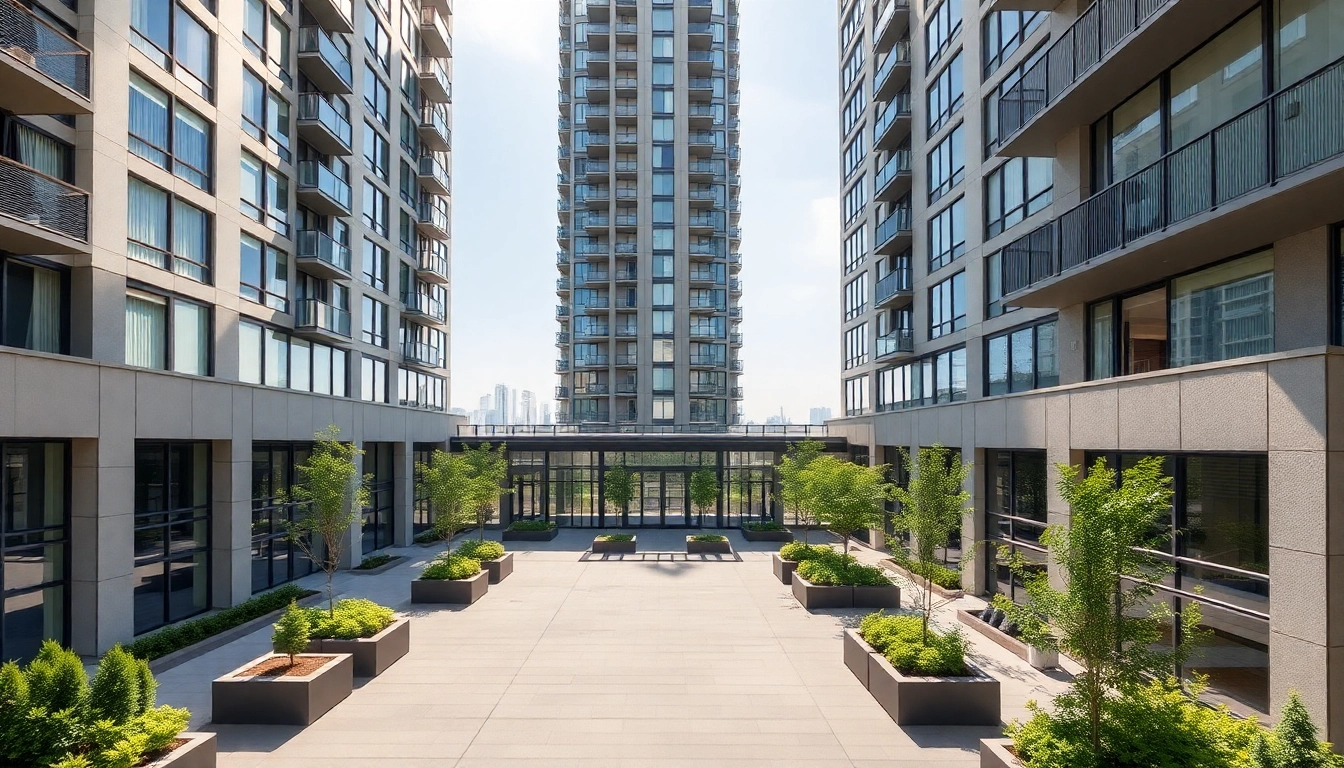Expert Strata Management Solutions in Vancouver for Seamless Property Oversight

Understanding Strata Management: Foundations and Key Principles
What is Strata Management and Why It Matters
Strata management, also known as body corporate management, is a specialized field within property management that oversees residential, commercial, or mixed-use developments divided into individual units and common areas. In Vancouver and across British Columbia, strata management plays a crucial role in maintaining property value, ensuring legal compliance, and fostering harmonious community living. The significance of effective strata management cannot be overstated—well-managed strata corporations attract desirable tenants and buyers, minimize disputes, and sustain the longevity of the property.
When residents and owners collaborate with professional strata managers, they benefit from streamlined operation of shared amenities, transparent financial practices, and proactive maintenance, all of which contribute to a seamless living experience. In the context of Vancouver’s dynamic real estate market, where property values fluctuate and legal requirements evolve frequently, competent strata management becomes instrumental in navigating complex regulations like the Strata Property Act and ensuring compliance.
To explore reliable strata management services in Vancouver, property owners and councils seek partners who deliver tailored solutions that respect the unique needs of each community. Whether managing high-rise condominiums, townhouse communities, or commercial strata, professional management ensures that each strata corporation operates efficiently, legally, and sustainably.
Core Responsibilities of a Strata Manager
A competent strata manager shoulders a wide range of responsibilities vital for the smooth operation of a strata corporation. These generally include:
- Financial Management: Creating budgets, managing levies, collecting contributions, and maintaining transparent financial records. Sound financial oversight ensures funds are available for maintenance, repairs, and contingencies.
- Legal Compliance: Ensuring adherence to local laws, the Strata Property Act, bylaws, and other regulations. Managers handle legal notices, enforce rules, and facilitate dispute resolution.
- Maintenance and Repairs: Coordinating routine maintenance, emergency repairs, and long-term upgrades. Regular inspections and proactive planning extend the lifespan of building systems and amenities.
- Community Engagement: Acting as a liaison between owners, tenants, and the strata council. Maintaining effective communication fosters trust and transparency within the community.
- Administrative Duties: Managing records, convening meetings, preparing agendas, and recording minutes. Proper documentation supports accountability and effective governance.
- Insurance Management: Ensuring appropriate coverage for property and liability risks, assisting with claims, and managing premiums.
Successful strata managers integrate these responsibilities with strategic planning and stakeholder engagement, creating a balanced approach that prioritizes both operational efficiency and community satisfaction.
Legal Framework and Compliance in Vancouver
In Vancouver, strata management operates within a robust legal framework provided primarily by the Strata Property Act of British Columbia. The act stipulates the roles and responsibilities of strata councils, owners, and managers while establishing procedures for meetings, financial management, dispute resolution, and bylaw enforcement.
Key legal considerations include:
- Strata Corporation Governance: Governance structures outline how decisions are made, voting rights, and meeting protocols. Ensuring smooth compliance involves regular adherence to these procedures.
- Financial Reporting and Auditing: Accurate bookkeeping, annual financial statements, and audits are mandated to maintain transparency and accountability to owners.
- Maintenance Standards: Legal compliance extends to upkeep of common property and adherence to safety standards, especially in high-rise buildings with complex infrastructure.
- Bylaws and Rules Enforcement: Enforcing bylaws, which govern conduct, use of amenities, and property modifications, prevents disputes and maintains order.
- Dispute Resolution: The act provides mechanisms for addressing conflicts, including arbitration, mediation, and, when necessary, legal proceedings.
Understanding and implementing these compliance measures requires a skilled management partner familiar with local laws, ongoing legislative updates, and best practices to protect your investments and community harmony. As Vancouver’s seasoned experts in this domain, Metrowest Building Services ensures that your strata management remains inline with current regulations, fostering smooth operations and legal peace of mind.
Best Practices for Effective Strata Management in Metro Vancouver
Financial Oversight and Budgeting Strategies
Financial management is the backbone of successful strata operations. Effective budgeting encompasses short-term expenditures and long-term capital improvements, ensuring the community’s assets are preserved and enhanced. Best practices include:
- Accurate Financial Planning: Developing realistic budgets based on historical data, upcoming maintenance needs, and reserve fund requirements.
- Reserve Fund Management: Maintaining adequate reserve funds for major repairs and replacements, such as roof repairs or elevator upgrades, prevents unexpected levies or special assessments.
- Transparent Financial Reporting: Providing owners with detailed statements, regular updates, and easy-to-understand summaries bolsters trust.
- Efficient Levy Collection: Automating invoicing and implementing electronic payment options streamline cash flow and reduce delinquency.
- Cost Control and Vendor Management: Negotiating service contracts and monitoring expenditures ensure optimal utilization of funds.
Implementing these strategies requires proactive financial oversight, utilizing accounting software tailored for strata, and ongoing staff training. The goal is to strike a balance between cost-effectiveness and maintaining high standards of property care.
Community Engagement and Communication
Strong community engagement fosters a positive living environment and minimizes conflicts. Key tactics include:
- Regular Communication: Monthly newsletters, online portals, and community meetings keep owners informed about upcoming projects, financial health, and community issues.
- Accessibility: Maintaining open channels for residents to express concerns fosters trust and transparency.
- Resident Participation: Encouraging owner involvement in committees or decision-making processes increases buy-in and collective responsibility.
- Conflict Resolution: Addressing disputes promptly through mediation and clear communication channels diminishes escalation risk.
Success resides in creating an inclusive, well-informed community where residents feel heard and valued. Technology platforms for communication and feedback are pivotal in modern strata management, leading to higher community satisfaction and loyalty.
Maintenance Planning and Building Compliance
Routine maintenance and adherence to building codes preserve property value and property safety. Effective practices include:
- Proactive Inspections: Regular walk-throughs identify potential issues before they escalate, reducing long-term costs.
- Preventive Maintenance Programs: Scheduled tasks such as HVAC servicing, roof inspections, and safety system checks extend asset lifespan.
- Vendor Partnerships: Building relationships with reliable contractors ensures quality work and competitive pricing.
- Long-Term Capital Planning: Developing 5-10 year replacement and upgrade plans aligned with budget forecasts。
- Compliance Monitoring: Ensuring adherence to safety standards, fire codes, and accessibility laws reduces legal risks and insurance premiums.
Incorporating technology, such as digital maintenance logs and asset management tools, enhances tracking and accountability, leading to superior upkeep and compliance.
Choosing the Right Strata Management Partner
Qualities of a Trusted Strata Management Company
Partnering with a reputable strata management company is critical for community success. Essential qualities include:
- Experience and Licensure: Proven track record with local knowledge and valid licensing as per provincial regulations.
- Transparent Communication: Open, honest, and timely communication fosters trust.
- Tailored Service Offerings: Ability to customize services to meet the unique needs of small or large communities.
- Technological Competency: Use of innovative digital platforms for financial, maintenance, and communication processes.
- Customer Service Orientation: Dedicated, accessible, and proactive in addressing residents’ needs and concerns.
Metrowest Building Services exemplifies these qualities by focusing on personalized service, local expertise, and transparent operations.
Tailored Services for Small vs. Large Communities
While larger communities may benefit from complex, resource-intensive management, small strata groups require personalized attention and flexible solutions. Key considerations include:
- For Small Strata: Cost-effective, nimble management with direct access to managers, simplified administrative procedures, and budget-conscious maintenance planning.
- For Large Strata: Comprehensive management services, sophisticated financial reporting, and dedicated teams to handle complex governance structures.
At Metrowest, we recognize the importance of customizing our approach. Our tailored solutions ensure small communities receive the same levels of dedication and care as their larger counterparts, emphasizing personalized service and proactive governance.
Case Studies: Successful Strata Management in Vancouver
Case Study 1: Small Residential Strata in Burnaby
This community faced frequent disputes over maintenance fees and rule enforcement. By implementing transparent budgeting, regular community meetings, and clear bylaws enforcement, the management team improved resident satisfaction, reduced disputes, and increased property values.
Case Study 2: High-Rise Commercial-Residential Community in West Vancouver
Through comprehensive maintenance programs, digital communication platforms, and strategic reserve fund planning, the strata council successfully increased operational efficiency, minimized legal risks, and enhanced community cohesion.
Innovative Technologies Enhancing Strata Management
Digital Platforms for Financial and Maintenance Tracking
The adoption of cloud-based management software has revolutionized strata operations. Platforms like Dwell or Buildium enable real-time financial reporting, expense tracking, and automated levy collection, reducing errors and increasing transparency.
Maintenance management tools facilitate scheduling, vendor management, and detailed logs, ensuring proactive upkeep and accountability.
Communication Tools for Community Engagement
Mobile apps, online portals, and email automation foster seamless communication between residents and management. Features such as digital bulletin boards, feedback forms, and virtual meetings cultivate active participation and transparency, essential for fostering community trust.
Data Security and Privacy Considerations
As digital solutions become pervasive, safeguarding sensitive data remains paramount. Management companies must employ robust cybersecurity protocols, including encryption, secure login procedures, and compliance with privacy laws, to protect resident information.
Future Trends and Challenges in Strata Management
Adapting to Regulatory Changes
The legislative landscape for strata management continues to evolve. Recent initiatives focus on increasing transparency, enhancing dispute resolution processes, and promoting sustainable practices. Forward-thinking managers proactively stay ahead of legal updates, integrating new compliance requirements into their operations.
Sustainable Practices and Green Building Initiatives
Green initiatives, such as energy-efficient systems, waste reduction, and renewable energy integrations, are becoming standard expectations. Incorporating sustainability into strata management reduces costs and environmental impact while increasing community appeal.
Handling Disputes and Conflict Resolution
Disputes are inevitable but manageable through early intervention, mediation, and clear governance frameworks. Advanced conflict resolution protocols and trained mediators are vital in maintaining community harmony and avoiding costly legal proceedings.


